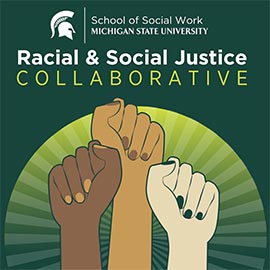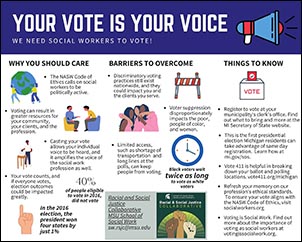Your Vote Is Your Voice: Why Social Workers Need to be Heard
October 28, 2020
Your Vote Is Your Voice: Why Social Workers Need to be Heard

The Michigan State University School of Social Work Racial and Social Justice Collaborative works to highlight and enhance systemic investment in racial and social justice through engagement of all school members, including faculty, staff, students, and community members. This group builds a collaborative framework to implement the School of Social Work’s focus on racial and social justice. The racist acts and disparities seen on our campus and through the United States’ government system must be paid close attention to and addressed. As a collaborative we are committed to doing this in a way that promotes peace while simultaneously demanding social change. It is our goal to bring to light relevant issues around racial and social justice in order to educate readers as they meet the everchanging field of social work.
Marginalized groups of people have had to fight for the right to vote throughout history and continue to fight today. When elections in the U.S. first began, only white upper-class men were given the privilege to vote. African American men were not granted the right to vote until 1870 with the passing of the 15th Amendment and it was not until 1920 that the work of the women’s suffrage movement paid off and women could vote. Even so, voting was not guaranteed, as voter taxes and literacy tests were used to keep people of color out of the polls. The Voting Rights Act of 1965 banned literacy tests and other prerequisites meant to limit voter eligibility and prohibited voter discrimination based on a person’s race or color. Jurisdictions with a history of voter discrimination were appointed Federal examiners and could not change voting practices without approval from the U.S. Attorney General.
Barriers continue to keep individuals from voting today.
Though voting appears to be one of the most basic forms of participation in a democracy, voter turnout in the U.S. has been lower than other established democracies around the world, with only 56% of Americans voting in the 2016 election.
The COVID-19 pandemic has reshaped the way citizens can vote. Estimates from Global Citizen suggest that up to 75% of Americans could vote by mail during this election, a higher mail-in rate than any other election in history. Although there is an increased use of alternative voting methods, certain rules and regulations still suppress the vote of some. For example, Texas recently reduced access to convenient voting methods by limiting its number of ballot drop-off boxes to only one per county. This means that in counties with major cities, thousands of voters must flock to one location to drop off their ballot if they choose not to mail them. Contrarily, voters in rural communities could be expected to provide their own transportation and travel for hours if they prefer to drop their ballot. This issue is compounded by the service and financial struggles that the United States Postal Service has reported over the past months. Elimination of ballot drop boxes and Post Office cuts could strongly discourage voter participation, especially during COVID-19 when traveling and being in large groups is discouraged.
More than half of U.S. states do not offer same-day registration, resulting in citizens losing their voting right if they fail to meet registration deadlines. In addition to this, voter identification laws that either request or require identification be presented at the time of voting impacts 36 states for the 2020 election. In the state of Michigan, a government issued identification card is requested, but if it is not presented, voters can sign an affidavit and vote on a regular ballot. Still, this requirement by other states disproportionately impacts Black and Brown communities during elections, resulting in the suppression of votes.
New data from the Public Religion Research Institute (PRRI) has exposed evidence of barriers to voting for both Black and Brown voters, stating that 9% of both Black and Hispanic respondents reported they or someone in their household did not have proper identification to vote in the 2016 election, compared to 3% of white respondents.
ID laws are not the only form of voter suppression. Voter suppression also disproportionately impacts people living in poverty, people of color, and women in the form of purged voter rolls, disenfranchised felons, gerrymandering, myths of voter fraud, closed polling locations, and weekday voting. Long wait times to vote at overpopulated polling locations serve as a barrier as well as things like polling location accessibility by public transportation and general misinformation on polling locations. A study done by the University of California, Los Angeles looked at location data from 10 million smartphones to figure out voter wait times across the country. The results were clear. Voters in predominantly Black neighborhoods waited 29% longer, on average, than those in white neighborhoods. Excessive wait times at poll locations is not just an inconvenience, it is a civil rights issue and the U.S Election Assistance Commission estimates that between 500,000 and 700,000 votes were lost due to the discouragement of long poll lines during the 2012 election.
As social workers, there is a dilemma presented when few people make it to the voting polls-- policies and procedures that are decided on by individuals in power greatly impact our clients. The NASW Code of Ethics states that we have an obligation to be civically engaged, which means that not only is it our responsibility to make sure we vote, but to vote in a way that allows the voices of our most vulnerable populations to be amplified. Ethical standard 6.04 states that social workers should promote policies and practices that demonstrate a respect for difference, support the expansion of cultural knowledge and resources, advocate for programs and institutions that demonstrate cultural competence, and promote policies that safeguard the rights and confirm equity and social justice for all people. For social workers, voting goes beyond just being politically active. It is also a means to ensuring that the decisions made on our ballots will best oppose institutional oppression and result in the greatest benefit to our clients. Not only is voting as a social worker important, but it is also vital to encourage the client populations that we work with to express their right to vote as well. Knowing there are barriers in place for these clients gives social workers the insight to intervene and start talking about voting and the voting process with our clients.
In anticipation of the 2020 election, the NASW has developed a 2020 Election Initiative to increase voter participation. In this initiative they highlight the fact that 2020 is indeed a consequential election and the profession of social work, as well as clients we serve, will be greatly affected by this year’s election outcome.
In 2018, Michigan voters passed Proposal 3, otherwise known as the “Promote the Vote” Petition. As a result, Michigan now has no-reason absentee ballots, the option to automatically register to vote when updating identification, and same day registration on Election Day with proof of residency. For Michiganders, voting will be more accessible now than it was during the last presidential election. This is due to those who used their vote to create change during the previous midterm elections, further illustrating the importance of participating in local elections, not just presidential ones! Initiatives such as Proposal 3 give voters the power to decide how accessible voting will be for both themselves and future voters in their state.
Michigan State University is doing its part to increase student voting by participating in the Big 10 Voting Challenge 2020. This initiative is nonpartisan and strives to promote civic engagement as well as encourage more students to vote in the 2020 election. MSU also held a Voter Registration Virtual Rally on September 22, with guest speakers Tom Izzo and Mel Tucker. This event offered a space to get all questions answered about registering to vote, where a student can vote, and how students can make their vote count on election day.
In conclusion, the Racial and Social Justice Collaborative encourages all social workers to:
- Make sure we are registered to vote. For those who live in Michigan, learn more about how to register.
- Understand what is on our ballot before we vote. Michigan voters can do this by visiting the Michigan Voter Information Center’s website.
- Exercise our voting rights, by voting early or planning ahead before going to the polls on Election Day.
- Social workers should empower our clients and communities to vote. Help those we serve make sure their voice is heard.
- Pay attention to policies and procedures around voting and make sure elections are continuing to be accessible to the most vulnerable populations.
- Vote in local elections. Local governance greatly influences policies and procedures that regulate local nonprofits and other service agencies where social workers exist.
- Uphold the values stated in the NASW Code of Ethics around being socially and politically engaged, and make sure our vote continues to promote social work values.
Find the Racial and Social Justice Collaboration on social media.





